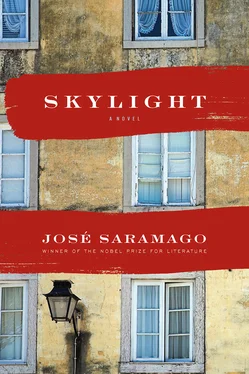Father and daughter glanced at each other.
“Do you know anything, Claudinha?” asked her mother.
“Me? No, I don’t know anything.”
“Or do you just not want to tell us…”
“I’ve already told you: I don’t know anything!”
Rosália slipped the darning egg into the sock she was working on. She did this very slowly, as if hoping to fan the curiosity of husband and daughter. Then she said:
“Haven’t you noticed that more than a week has gone by since Senhor Morais visited her?”
Anselmo hadn’t noticed and said so at once. Claudinha had, but said nothing. Then:
“Senhor Morais hasn’t been well. He told me so himself.”
Somewhat disappointed, Rosália thought that not feeling well was hardly reason enough.
“You might be able to find out, Claudinha…”
“Find out what?”
“Well, if they’ve had a falling-out, because that’s what I think must have happened.”
Claudinha gave a bored shrug:
“I’m hardly going to ask that, am I?”
“Why not? You owe Dona Lídia a big favor, so it’s only natural you should take an interest.”
“What favor do I owe Dona Lídia? If I owe anyone anything, it’s Senhor Morais.”
“Be fair now, dear,” said Anselmo. “If it hadn’t been for Dona Lídia, you wouldn’t have gotten this job…”
Claudinha did not answer. She turned to the radio and started twiddling the dial in search of a station broadcasting the kind of music she liked. She found a commercial station. A singer with a “romantic” voice was lamenting his amorous misfortunes in music and words that were equally banal. Once the singer had finished, and seduced perhaps by that silly song, Claudinha said:
“All right. If you like, I can try to find out. Besides,” she added after a long pause, “if I ask him, Senhor Morais is sure to tell me.”
Claudinha was right. When she got home the next evening, she knew the whole story. They hadn’t expected her so early. It was just after half past seven. Having greeted her parents, she announced:
“OK, I know everything.”
Before allowing her to continue, however, Anselmo wanted to know what she was doing home at that hour.
“I didn’t go to my lesson,” she said.
“So you’re late, then.”
“I stayed behind so that Senhor Morais could tell me all about it.”
“So?” asked Rosália eagerly.
Claudinha sat down. She seemed somewhat nervous. Her bottom lip was trembling slightly, her breast heaving, although this could have been the result of the brisk walk home from the office.
“Come on, dear, we’re dying to hear.”
“They’ve split up. Senhor Morais received an anonymous letter saying…”
“Saying what?” asked husband and wife, impatient with the delay.
“Saying that Dona Lídia was deceiving him.”
Rosália clapped her hands to her thighs:
“I thought as much.”
“There’s worse to come,” Claudinha went on.
“Worse?”
“The letter said she was deceiving him with Senhor Silvestre’s lodger.”
Anselmo and Rosália were duly horrified.
“That’s disgraceful!” exclaimed Rosália. “But I can’t believe Dona Lídia would do such a thing!”
Anselmo disagreed:
“It seems perfectly possible to me. What else can you expect from someone living the kind of life she lives?” And more quietly, so that his daughter would not hear, he added his favorite phrase: “Well, you know what I always say: birds of a feather…”
Claudinha heard the muttered comment and blinked rapidly, pretending that she hadn’t. Rosália said:
“It just doesn’t seem possible.”
An awkward silence ensued, broken by Claudinha:
“Senhor Morais showed me the letter. He said he had no idea who had sent it.”
Anselmo thought it proper to condemn all anonymous letters, describing them as “vile,” but Rosália leapt in with all the holy indignation of someone defending a just cause:
“If it wasn’t for anonymous letters, a lot of things would remain hidden. You wouldn’t want poor Senhor Morais playing the cuckold, would you?”
They were heading toward the decision that the events cried out for. Anselmo agreed:
“Naturally, if I was in the same situation, I’d certainly want to know…”
Scandalized at such a hypothesis, his wife broke in:
“So that’s what you think of me, is it? Our daughter is here listening, you know!”
Claudinha got up and went to her room. Still bristling, Rosália commented:
“Honestly, the things you come out with! How could you?”
“All right, all right. Isn’t it about time we ate?”
The decision was postponed for the time being. Claudinha returned from her room and, shortly afterward, they were seated at the supper table. During the meal, husband and wife talked of nothing else, while Claudinha remained silent throughout, as if this were too scabrous a conversation for her to take any part in. Rosália and Anselmo examined the matter from all angles, except one, the one that would require them to make a decision. They both knew it was necessary, but tacitly put it off until later. Rosália declared that she had never liked Senhor Silvestre’s lodger and reminded her husband that the very first time she’d clapped eyes on the man, she had commented on his shabby appearance.
“What I don’t understand,” said Anselmo, “is why Dona Lídia would get involved with some vagrant who has to live in rented rooms. Whatever can have possessed her?”
“It’s obvious, isn’t it? As you yourself said just now: what can you expect of someone living the life she lives?”
“Yes, you’re right.”
When supper was over, Claudinha said she had a headache and was going to bed. Feeling able at last to talk more freely, husband and wife looked at each other, shook their heads and simultaneously opened their mouths to speak, then promptly closed them again, each waiting for the other to begin. In the end, it was Anselmo who spoke:
“Well, what can you expect of a whore?”
“Shameless hussy!”
“I don’t blame him, of course. He’s a man, after all, and simply took what was offered. But her, when she’s so well set up at home!”
“Nice dresses, lovely furs, beautiful jewelry…”
“That’s what I mean, but once you’ve stumbled, it’s easy enough to stumble again. It’s in the blood. People like her are only happy when they’re thinking shameless thoughts.”
“If only they were just thoughts!”
“And with Senhor Silvestre’s lodger too, right under Senhor Morais’s nose!”
“The woman has no shame at all!”
All these things had to be said, because the decision could only be made when blame had been duly allotted. Anselmo picked up his knife and, using the blade, began carefully shepherding the crumbs on the table into a neat pile. His wife observed him intently, as if the very foundations of the building depended on the successful outcome of this task.
“Well, in the circumstances,” said Anselmo, once all the crumbs were safely gathered in, “we have to take a stand.”
“Indeed.”
“We have to act.”
“I agree.”
“Claudinha must have nothing more to do with her. She’s a bad influence.”
“I wouldn’t let Claudinha near her. In fact, it’s been on my mind for a while now.”
Anselmo picked up his plate to reveal more crumbs, which he added to the others, declaring:
“And as for us, we will never again speak to that woman, not even to say good morning or good afternoon. We’ll just pretend she doesn’t exist.”
They were in complete agreement. Rosália began clearing the table and Anselmo took his photo album out of a drawer in the sideboard. They did not linger long after supper, though. High emotion is always draining. Husband and wife went to their bedroom, where they continued their harsh assessment of Lídia’s behavior. Their conclusion was this: some women — women whose mere existence is a blot on the lives of honest folk — simply deserve to be wiped from the face of the earth.
Читать дальше












